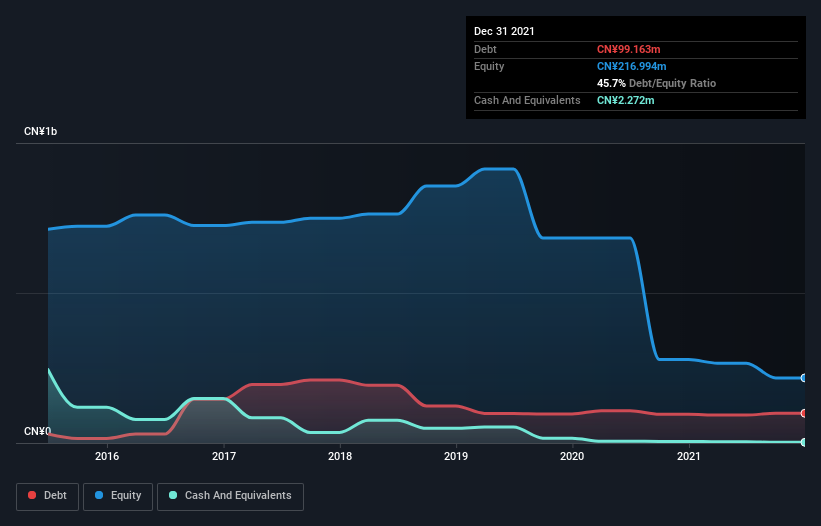- Hong Kong
- /
- Healthcare Services
- /
- SEHK:574
Is Pa Shun International Holdings (HKG:574) Using Debt In A Risky Way?

The external fund manager backed by Berkshire Hathaway's Charlie Munger, Li Lu, makes no bones about it when he says 'The biggest investment risk is not the volatility of prices, but whether you will suffer a permanent loss of capital.' It's only natural to consider a company's balance sheet when you examine how risky it is, since debt is often involved when a business collapses. We can see that Pa Shun International Holdings Limited (HKG:574) does use debt in its business. But the real question is whether this debt is making the company risky.
What Risk Does Debt Bring?
Generally speaking, debt only becomes a real problem when a company can't easily pay it off, either by raising capital or with its own cash flow. Part and parcel of capitalism is the process of 'creative destruction' where failed businesses are mercilessly liquidated by their bankers. However, a more frequent (but still costly) occurrence is where a company must issue shares at bargain-basement prices, permanently diluting shareholders, just to shore up its balance sheet. Of course, debt can be an important tool in businesses, particularly capital heavy businesses. The first thing to do when considering how much debt a business uses is to look at its cash and debt together.
View our latest analysis for Pa Shun International Holdings
What Is Pa Shun International Holdings's Net Debt?
As you can see below, Pa Shun International Holdings had CN¥99.2m of debt, at December 2021, which is about the same as the year before. You can click the chart for greater detail. However, because it has a cash reserve of CN¥2.27m, its net debt is less, at about CN¥96.9m.

How Strong Is Pa Shun International Holdings' Balance Sheet?
According to the last reported balance sheet, Pa Shun International Holdings had liabilities of CN¥227.7m due within 12 months, and liabilities of CN¥23.9m due beyond 12 months. Offsetting these obligations, it had cash of CN¥2.27m as well as receivables valued at CN¥66.7m due within 12 months. So it has liabilities totalling CN¥182.6m more than its cash and near-term receivables, combined.
This deficit casts a shadow over the CN¥67.1m company, like a colossus towering over mere mortals. So we'd watch its balance sheet closely, without a doubt. After all, Pa Shun International Holdings would likely require a major re-capitalisation if it had to pay its creditors today. When analysing debt levels, the balance sheet is the obvious place to start. But it is Pa Shun International Holdings's earnings that will influence how the balance sheet holds up in the future. So if you're keen to discover more about its earnings, it might be worth checking out this graph of its long term earnings trend.
Over 12 months, Pa Shun International Holdings made a loss at the EBIT level, and saw its revenue drop to CN¥86m, which is a fall of 82%. To be frank that doesn't bode well.
Caveat Emptor
Not only did Pa Shun International Holdings's revenue slip over the last twelve months, but it also produced negative earnings before interest and tax (EBIT). Indeed, it lost a very considerable CN¥12m at the EBIT level. Combining this information with the significant liabilities we already touched on makes us very hesitant about this stock, to say the least. Of course, it may be able to improve its situation with a bit of luck and good execution. But we think that is unlikely since it is low on liquid assets, and made a loss of CN¥54m in the last year. So we think this stock is quite risky. We'd prefer to pass. When analysing debt levels, the balance sheet is the obvious place to start. However, not all investment risk resides within the balance sheet - far from it. For instance, we've identified 3 warning signs for Pa Shun International Holdings (1 shouldn't be ignored) you should be aware of.
At the end of the day, it's often better to focus on companies that are free from net debt. You can access our special list of such companies (all with a track record of profit growth). It's free.
New: Manage All Your Stock Portfolios in One Place
We've created the ultimate portfolio companion for stock investors, and it's free.
• Connect an unlimited number of Portfolios and see your total in one currency
• Be alerted to new Warning Signs or Risks via email or mobile
• Track the Fair Value of your stocks
Have feedback on this article? Concerned about the content? Get in touch with us directly. Alternatively, email editorial-team (at) simplywallst.com.
This article by Simply Wall St is general in nature. We provide commentary based on historical data and analyst forecasts only using an unbiased methodology and our articles are not intended to be financial advice. It does not constitute a recommendation to buy or sell any stock, and does not take account of your objectives, or your financial situation. We aim to bring you long-term focused analysis driven by fundamental data. Note that our analysis may not factor in the latest price-sensitive company announcements or qualitative material. Simply Wall St has no position in any stocks mentioned.
About SEHK:574
Pa Shun International Holdings
An investment holding company, engages in the pharmaceutical distribution and manufacturing business in the People’s Republic of China.
Low and slightly overvalued.
Market Insights
Community Narratives



